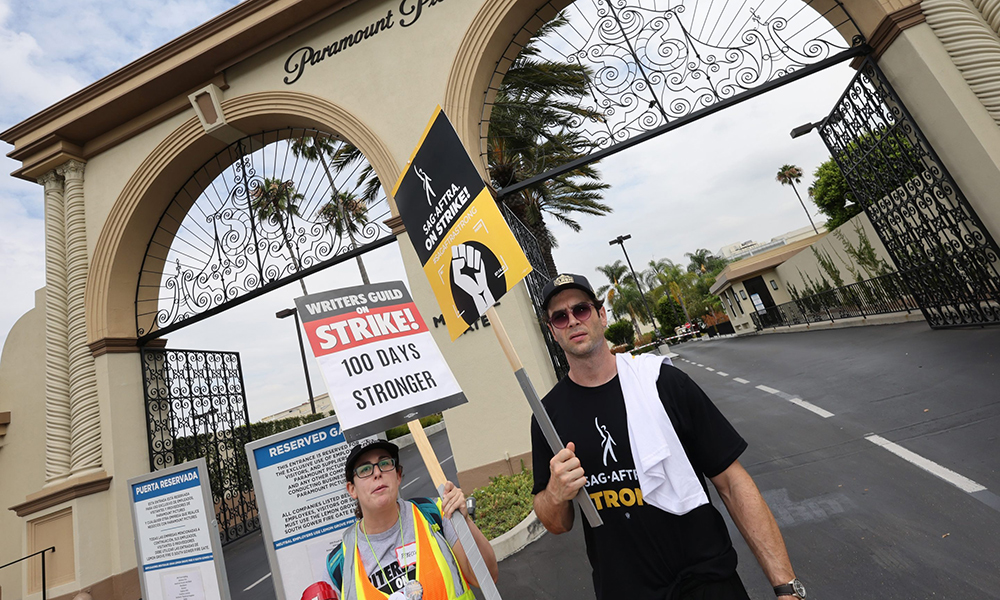
随着好莱坞编剧和演员的双重罢工持续进行,大型媒体公司纷纷公布了超预期的利润。
虽然制作和发行电影和电视节目的公司高管们都表示,他们希望员工能尽快复工,但他们所在的企业从停摆中收获了巨大的短期利益:不制作意味着零支出。
上个月,网飞公司(Netflix Inc.)以这样一条新闻拉开了财报季的序幕:由于罢工,预计今年的自由现金流将比最初的预测高出约15亿美元。华纳兄弟探索公司(Warner Bros. Discovery Inc.)第二季度在电影和电视制作成本上节省了1亿美元。如果罢工持续到年底,节省的成本将达到数亿美元。
华特迪士尼公司(Walt Disney Co.)表示,预计罢工将使该公司今年的影视制作成本减少30亿美元。
所有这些都在一定程度上解释了为什么在达成和解方面进展甚微。这些电影公司拥有庞大的片库,包括新近制作的电影和电视节目,在罢工造成的长期损害显现之前,他们将获得数十亿美元的额外现金。同样,许多发起罢工的美国编剧工会(Writers Guild of America)和美国电影演员工会(Screen Actors Guild)会员都在好莱坞之外从事其他工作,几乎没有妥协的压力。
派拉蒙环球(Paramount Global)首席执行官鲍勃·巴基什没有公布该公司节省的成本的具体数字[派拉蒙环球是哥伦比亚广播公司(CBS)和派拉蒙影业的母公司]。他本周告诉投资者,公司有足够的电影和节目来满足观众在未来几个月的线上线下观影需求。
“我们的状况相当不错。”巴基什说。
编剧们的罢工始于5月份,持续时间已经超过了工会2007年的(上一次)罢工。新的电影和电视制作,尤其是编剧系列剧的制作几乎停滞。演员们于7月罢工。
周四,美国编剧工会表示收到了电影公司谈判小组提出的新会面请求,并将于周五会面。美国编剧工会表示,希望对方对最近的提议作出回应。
罢工也带来了一些影响:电视台正在重新调整秋季节目表,增加不受罢工影响的真人秀节目。由于不允许演员在罢工期间宣传他们的电影,电影公司推迟了一些电影的上映。
不过,在与投资者的电话会议上,高管们还是表示将影响降到了最低。康卡斯特公司(Comcast Corp.)总裁麦克·卡瓦纳[负责美国国家广播环球公司(NBC Universal)的电影和电视业务]预测,由于停摆,今年的自由现金流将增加,营运资本将减少。罢工结束后,这种情况将发生逆转。
卡瓦纳说:“一切都在掌控之中。”
虽然编剧和演员由不同的工会代表,但他们在与电影公司的谈判中提出了类似的要求。他们要求增加基本工资,并从流媒体服务上播放的节目中获得收入分成。他们还希望确保自己的工作不会被人工智能取代。
演员兼罢工组长达桑·所罗门七月底在(罢工)纠察线上说:“电影公司想压榨我们,这样他们就能获得更多利润,我们受够了。我们需要和以前一样靠演戏谋生。”
网飞公司联席首席执行官泰德·萨兰多斯在财报电话会议上告诉投资者,他的父亲是一名工会电工,他理解罢工可能给家庭带来的影响。
他说:“存在一些复杂的问题。我们将竭尽全力,以尽快达成协议。”(财富中文网)
译者:中慧言-王芳
随着好莱坞编剧和演员的双重罢工持续进行,大型媒体公司纷纷公布了超预期的利润。
虽然制作和发行电影和电视节目的公司高管们都表示,他们希望员工能尽快复工,但他们所在的企业从停摆中收获了巨大的短期利益:不制作意味着零支出。
上个月,网飞公司(Netflix Inc.)以这样一条新闻拉开了财报季的序幕:由于罢工,预计今年的自由现金流将比最初的预测高出约15亿美元。华纳兄弟探索公司(Warner Bros. Discovery Inc.)第二季度在电影和电视制作成本上节省了1亿美元。如果罢工持续到年底,节省的成本将达到数亿美元。
华特迪士尼公司(Walt Disney Co.)表示,预计罢工将使该公司今年的影视制作成本减少30亿美元。
所有这些都在一定程度上解释了为什么在达成和解方面进展甚微。这些电影公司拥有庞大的片库,包括新近制作的电影和电视节目,在罢工造成的长期损害显现之前,他们将获得数十亿美元的额外现金。同样,许多发起罢工的美国编剧工会(Writers Guild of America)和美国电影演员工会(Screen Actors Guild)会员都在好莱坞之外从事其他工作,几乎没有妥协的压力。
派拉蒙环球(Paramount Global)首席执行官鲍勃·巴基什没有公布该公司节省的成本的具体数字[派拉蒙环球是哥伦比亚广播公司(CBS)和派拉蒙影业的母公司]。他本周告诉投资者,公司有足够的电影和节目来满足观众在未来几个月的线上线下观影需求。
“我们的状况相当不错。”巴基什说。
编剧们的罢工始于5月份,持续时间已经超过了工会2007年的(上一次)罢工。新的电影和电视制作,尤其是编剧系列剧的制作几乎停滞。演员们于7月罢工。
周四,美国编剧工会表示收到了电影公司谈判小组提出的新会面请求,并将于周五会面。美国编剧工会表示,希望对方对最近的提议作出回应。
罢工也带来了一些影响:电视台正在重新调整秋季节目表,增加不受罢工影响的真人秀节目。由于不允许演员在罢工期间宣传他们的电影,电影公司推迟了一些电影的上映。
不过,在与投资者的电话会议上,高管们还是表示将影响降到了最低。康卡斯特公司(Comcast Corp.)总裁麦克·卡瓦纳[负责美国国家广播环球公司(NBC Universal)的电影和电视业务]预测,由于停摆,今年的自由现金流将增加,营运资本将减少。罢工结束后,这种情况将发生逆转。
卡瓦纳说:“一切都在掌控之中。”
虽然编剧和演员由不同的工会代表,但他们在与电影公司的谈判中提出了类似的要求。他们要求增加基本工资,并从流媒体服务上播放的节目中获得收入分成。他们还希望确保自己的工作不会被人工智能取代。
演员兼罢工组长达桑·所罗门七月底在(罢工)纠察线上说:“电影公司想压榨我们,这样他们就能获得更多利润,我们受够了。我们需要和以前一样靠演戏谋生。”
网飞公司联席首席执行官泰德·萨兰多斯在财报电话会议上告诉投资者,他的父亲是一名工会电工,他理解罢工可能给家庭带来的影响。
他说:“存在一些复杂的问题。我们将竭尽全力,以尽快达成协议。”(财富中文网)
译者:中慧言-王芳
Large media companies have been reporting stronger-than-expected profits as the twin strikes by Hollywood writers and actors grind on.
While the executives who make and distribute films and TV shows all say they’d like their workers to return soon, their businesses are seeing a huge short-term benefit from the work stoppages: No production means no expenses.
Netflix Inc. kicked off earnings season last month with this nugget of news: Projected free cash flow will be about $1.5 billion greater this year than originally forecast, due to the strikes. Warner Bros. Discovery Inc. saved $100 million on film and TV production costs in the second quarter. That will grow into hundreds of millions if the strikes continue to the end of the year.
Walt Disney Co. said Wednesday the strikes will contribute to a projected $3 billion reduction in film and TV production costs this year.
All of which partly explains why there’s been so little progress toward a settlement. The studios have vast libraries, including newly completed films and TV shows, and will rake in in billions of dollars in extra cash before longer-term damage from the strikes becomes evident. Similarly, many members of the striking Writers Guild of America and Screen Actors Guild have other jobs outside of Hollywood and face little pressure to compromise.
Paramount Global Chief Executive Officer Bob Bakish didn’t put a specific number on what his company, the parent of CBS and Paramount Pictures, is saving. He told investors this week the company had enough movies and shows to keep viewers watching and coming to theaters in the months ahead.
“We’re in pretty good shape,” Bakish said.
The strike by the writers, which began in May, has already run longer than the union’s previous work stoppage in 2007. New film and TV production, particularly for scripted series, has almost ground to halt. The actors walked out in July.
On Thursday, the Writers Guild said it received a new request to meet from the studios’ bargaining group and would do so Friday. The union said it expects a response to its recent proposals.
There has been some fallout: Networks are rejiggering their fall schedules, adding reality shows that aren’t affected by the walkouts. Studios are delaying some film releases because actors aren’t allowed to promote them while on strike.
Still, on conference calls with investors, executives minimize the impact. Mike Cavanagh, who oversees the NBCUniversal film and TV business as president of Comcast Corp., forecast higher free cash flow and lower working capital this year with production shut down. That will reverse when the strikes end.
“It’s all manageable,” Cavanagh said.
The writers and actors, while represented by separate unions, have similar demands in their negotiations with the studios. They’re seeking increases in their base pay, as well as a share of revenue from programs that run on streaming services. They also want assurances that their jobs won’t be replaced by artificial intelligence.
“We have studios really trying to squeeze us so they can get more profit, and enough is enough,’’ Darsan Solomon, an actor and strike captain, said on a picket line in late July. “We need to be able to make a living at this again.”
Netflix co-CEO Ted Sarandos told investors on an earnings call that his father was a union electrician and that he understood the toll strikes can take on families.
“There are a handful of complicated issues,” he said. “We’re super committed to getting to an agreement as soon as possible.”






